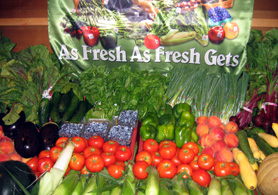AGRICULTURE DEPARTMENT RECEIVES FEDERAL GRANT FOR FOOD SAFETY
Fruit and Vegetable Farmers Will Be Trained in Third-Party Audit Requirements
For Immediate Release: August 28, 2007Contact: Jeff Beach
(609) 292-5531
(TRENTON) – The New Jersey Department of Agriculture has received an $85,000 Federal-State Marketing Improvement Program (FSMIP) grant from the USDA to provide education and training for growers to meet the demands of emerging trends in food safety. The grant is the largest single FSMIP grant awarded to any of the 21 states receiving funding this year. It will be used to support a program to educate fruit and vegetable farmers about the standards and practices required to receive third-party food safety certifications.
Consolidation in the retail supermarket sector has created fewer, but larger, distribution channels for growers. One of the best ways for small, independent farms to continue their access to the retail marketplace is to offer fresh agricultural products with documented certifications that meet national standards of quality control, consistency, and food safety.
The Department has been approved to conduct voluntary farm audits necessary for growers seeking third-party food safety certification, through a program that complies with the “USDA Good Agricultural Practices/Good Handling Practices” and is designed to conform to the “U.S. Food and Drug Administration’s Guide to Minimize Microbial Food Safety Hazards for Fresh Fruits and Vegetables.”
“In an era where consumers are more concerned about food safety than perhaps ever before, ensuring that our produce growers can meet the food-safety requirements of retailers is vital to their continued success,” said New Jersey Secretary of Agriculture Charles M. Kuperus. “Consumers already know that our Jersey Fresh fruits and vegetables are the freshest and tastiest available. This training will help our farmers go one step further in ensuring they are also safe.”
The grant, Secretary Kuperus said, will enhance the ongoing efforts of the Produce Safety Force, which was formed in December 2006 and includes representation from all links along the produce marketing chain, from producers through retailers as well as the New Jersey Department of Health and Senior Services.
“Working with Rutgers University, we already have been able to train more than 700 producers in the basics of food safety, preparing them to embark upon third-party audits,” said Secretary Kuperus. “This grant will help us provide the next step in that preparation.”
One of the most important components in this certification process is the grower’s practice of procedures that provide detailed product traceability. When food-borne illnesses arise, tracing the food responsible for the illness back to its source is crucial to determine how many more people may have been exposed to it.
The FSMIP grant will enable the Department and Rutgers University to develop methods and materials to train growers on the good agricultural practices and certification process necessary to receive third-party food safety certifications. An important component of the training will be a “mock audit” performed by third-party contractors. The mock audit will prepare growers prior to an actual food safety audit, which would be performed by USDA certified inspectors working for the NJDA. NJDA personnel will not be involved in the conduct of the mock audits, since the Department is responsible for the actual audit.
The NJDA’s third-party food safety certification program builds upon the Department’s Jersey Fresh Quality Grading program established in 1985. That program complemented the message of the Jersey Fresh marketing program. The Jersey Fresh Quality Grading program enhances the regional and national marketability of more than 80 New Jersey commodities to assure wholesale buyers that Jersey Fresh branded products meet or exceed U.S. No. 1 standards.
This year, USDA awarded over $1.3 million in 26 FSMIP grants to a total of 21 states. FSMIP grants support agricultural market research and demonstration projects to explore new and innovative approaches to marketing U.S. food and agricultural products, and helps to improve the efficiency and performance of the U.S. agricultural marketing system.



